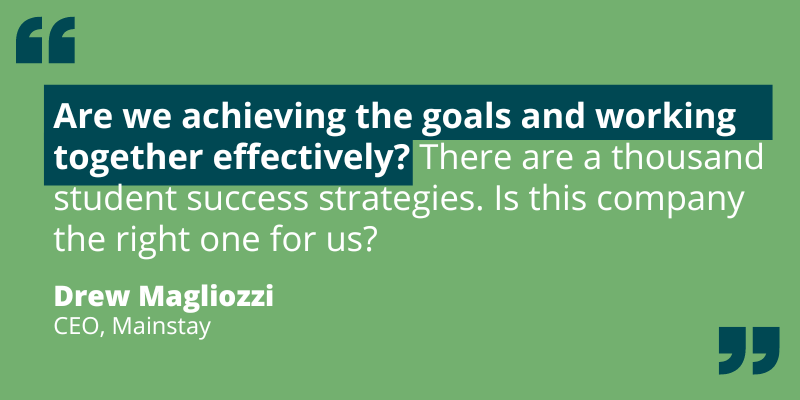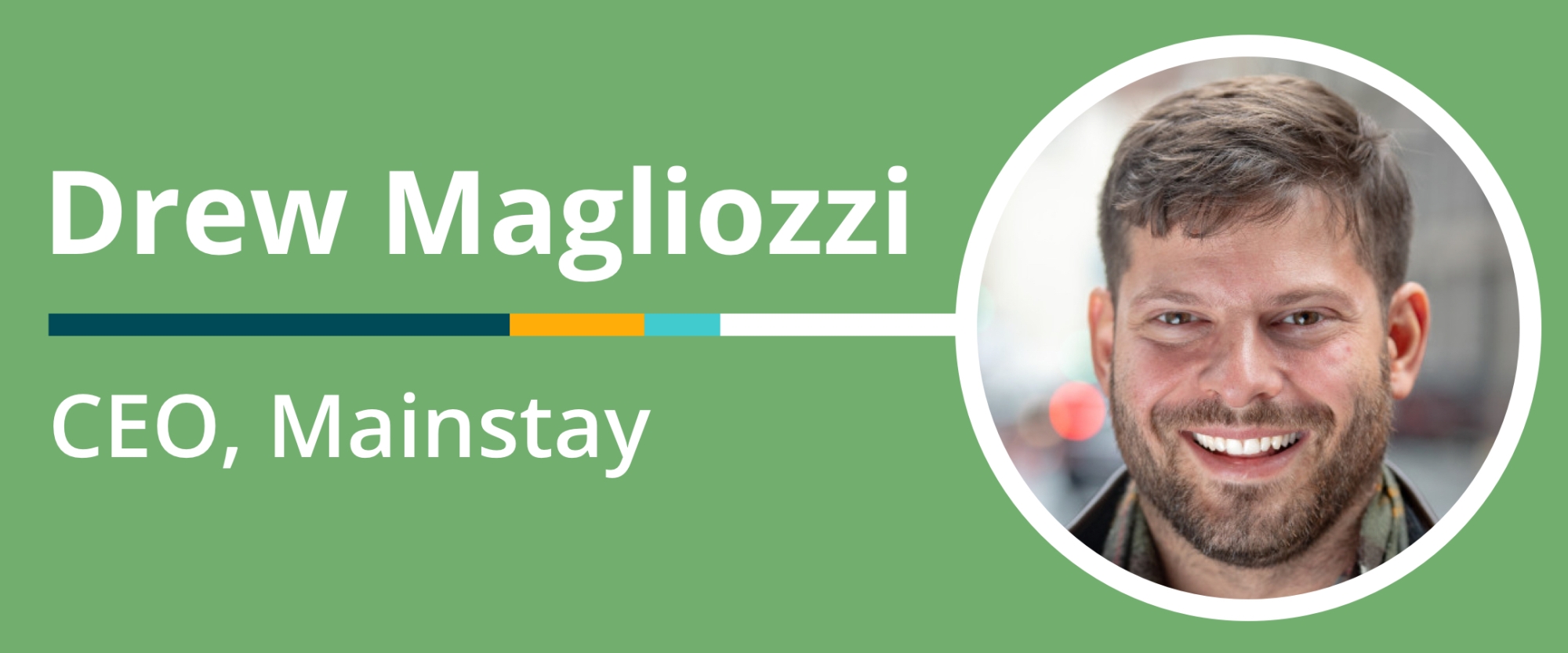In our mission to promote student success in higher education, the University Innovation Alliance (UIA) highlights the strategies of our member institutions. With the growing focus on artificial intelligence (AI) solutions, chatbots in particular, we spoke with Drew Magliozzi, CEO of Mainstay. Mr. Magliozzi joined us on the Innovation Spotlight Series to discuss being a technology partner, implementing a chatbot system, the risks and rewards of adopting any new tech, and how a tool reflects the intentions and abilities of its user.
Committing to Tech Integration
Mainstay is a communication platform that deploys behaviorally intelligent chatbots to engage and support higher education students by starting and measuring meaningful conversations. Currently used at institutions such as Georgia State University, Mainstay answers basic questions, sends notifications, frees advisors to focus on higher-level interactions, flags in-crisis students for interventions, and gathers data to help the institution run more efficiently. Since this sounds too good to be true, Mr. Magliozzi offered a bit of perspective:
"Technology is never the solution because there is no 'the solution.' One of our partners, Dawn Medley, always says, 'There's no such thing as a silver bullet, only silver buckshot.' We don't drive the outcomes; we help students make use of all the resources available to get the outcomes."
For institutions considering a new technology, he advises:
"Don't buy technology, especially AI technology like ours. I always say you should hire it. You're showing all the vulnerability around what's working/what's not at an institution and being really clear about goals and the challenges. But you're also taking a growth mindset with technology and training it constantly, starting small and incorporating it to get a little better every day. Because with AI in particular, the tool itself actually can improve with the right usage. So if you put your best people on it and commit to the care and feeding of a technology like that, it can pay huge dividends. AI could have breakthrough outcomes for decades to come."
And tech integration is rarely seamless:
"With any new technology or innovation, you're going to mess it up. Those moments differentiate what your success is going to be, and if you can rebound from those issues, you're going to be way more successful in the long run. A growth mindset with technology is going to get you a lot farther than a fixed mindset, while hopefully treating technology partners as true partners, not just vendors."
Healthy Technology Partnerships
When adopting an emerging, high-impact technology, institutions face many unknowns. Mr. Magliozzi described why a campus might choose Mainstay as a technology partner:
"We're the only platform consistently proven to move the needle on enrollment, retention, and academic success. We've done ten randomized controlled trials in the life of the company, and for some reason like to expose ourselves to all this scrutiny. And universities aren't searching for the what. In EdTech, it's more the why and the how that makes for the best partnership. Are we achieving the goals and working together effectively? There are a thousand student success strategies. Is this company the right one for us to get the job done? No technology is ever going to be successful if you're not doing the why and the how properly, which is focusing on the goal and doing the work, day in and day out."

Like any other working relationship, a good technology partnership is reciprocal. Mr. Magliozzi discussed what he expects from the university side:
"The highest levels of leadership need to stay informed, at least on a quarterly basis, understanding if this is aligned to their goals. One thing I've noticed in higher ed is not all levels of the organization actually know what the goals of the institution are. The best universities are able to share those goals and have everyone marching toward them. Vendors can be a great help, because they can be their justification for creating that level of transparency up and down the organization."
His favorite partners are the institutions that celebrate their wins:
"They're the fuel for innovation, not us. 'You helped us drop summer melt by 21%. Let's do it for year-to-year retention.' 'We increased year-to-year retention three percentage points, that's awesome. Can we move the needle for large lecture classes with high DFW rates?' 'Okay, we moved the needle for that large lecture course. Can we do it at the community college level?' The question is, who is always willing to take the next step with you?"
Risk Assessment for Tech Integration
Mr. Magliozzi understands that introducing new technology can also introduce an element of risk. He told us:
"Every university is different, but I think they should at least ask, 'Does it work? Do you have references that say it delivers what you claim it delivers? I want to know how we are going to do it. How you did it with Georgia State is not how we're going to do it here. We're a different school and we've got a different student body. Let's tell you our problems so that we can solve them together.' If we love the same problems, that's probably a good indicator of a partnership."
He described another kind of institutional risk once the technology has been adopted:
"The biggest risk is that you put it in a corner of your website and think that you're done because it'll work just fine in the corner of your website. But if you are not constantly weaving it into the fabric of how you operate, you're going to miss massive opportunities to move the needle on student outcomes, and do that consistently."
Dangers and Promises of AI
No current discussion about the implications of AI would be complete without mentioning ChatGPT. Mr. Magliozzi was happy to explain this increasingly popular -- and frequently vilified -- technology:
"ChatGPT is a breakthrough innovation. GPT is short for 'generative pre-training transformer,' derived from a 2017 paper called 'Attention Is All You Need' from researchers at Google. Folks might be familiar with DALL-E, an image generator, one for video called Stable Diffusion, one for voice recognition called Whisper. GPT is a large language model, LLM for short, and ChatGPT is fourth generation. It's from a company called Open AI, and it's really good for answering questions, generating letters, writing code, creative writing, it can pass a medical licensing exam, it can summarize thousand-page documents. It actually scored 147 on an IQ test, which puts it in the 99.9 percentile of intelligence. The technology is able to understand any sequence of letters, so add genomics or protein folding. An article by Steve Wolfram breaks down what exactly is happening, but fundamentally, ChatGPT is just remembering what it's been fed and predicting the next word in a sequence. It has this giant corpus of text, practically the whole gosh-darn Internet, fed into this meat grinder, and out comes really amazing prose. On the other side of the equation, sometimes it hallucinates or downright lies, doesn't know what year it is, and blatantly fabricates facts. The founder of Open AI says it's a mistake to rely on it for anything important right now. I think it's sparking people's imagination of what is coming down the line in the next ten years."
Mr. Magliozzi notes a similarity between educators' hesitancy around ChatGPT and how some institutions initially regarded chatbots and AI in general:
"I think there needs to be a Hippocratic Oath when it comes to AI in education, because it's moving so fast and has the potential to break stuff. I'm one for creative disruption, but some of the walls in higher ed are load bearing, and this could have huge negative consequences. So for Mainstay, we've always combated this sort of skepticism by holding ourselves to as much scientific rigor as possible. Are we moving the needle on the things we say we're doing? Are we closing gaps? If we are, we're on the right track, but you have to be relentless about it.
"Tech is never good or bad. It can be used for good or bad. The real key is who's deploying it and how. I think most folks are looking at chatbots as the AI Aristotle, the all-knowing oracle that will give them all the world's knowledge. But with education, rarely is it the most knowledgeable person who makes the best teacher. If you think of the best teacher you ever had, would they just tell you the answer? No. They would ask you a sequence of questions to break down the problem so that you, with your own thinking, could come up with the conclusion. So I think the greater potential for this technology is not the answers it gives, but the ways that it can help craft questions and follow-ups to students that encourage growth mindset, so that we can elevate the conversation between students and teachers. That, I think, has far greater potential than a chat replacement for Google or Wikipedia."
Note: This interview in the Innovation Spotlight Series originally aired on March 13, 2023 as part of the University Innovation Alliance’s Innovating Together Podcast, appearing live on Facebook, Twitter, and LinkedIn.
Links Mentioned in This Episode
• University Innovation Alliance
• Drew Magliozzi
• Mainstay
• Georgia State University
• Dawn Medley, Vice Provost for Enrollment Management and Retention, Stony Brook University
• "Attention Is All You Need" by Ashish Vaswani, et al., the research paper on which generative pre-training transformer (GPT) technology is based
• Article by Steve Wolfram ("What Is ChatGPT Doing... and Why Does It Work?" via Stephen Wolfram Writings, 2/124/23)
Bios of Guest and Co-Hosts

Guest: Drew Magliozzi, CEO, Mainstay
Andrew Magliozzi is a social entrepreneur, educator, and web developer, aspiring to help people learn and live better lives with the help of technology and human instruction. In 2014, he and Kirk Daulerio partnered with a shared vision to make college access more equitable through technology. This passion led them to start AdmitHub, a student engagement platform that uses behaviorally intelligent chatbots to connect students with the support they need to reach college. AdmitHub soon evolved to support millions of students with empathetic, conversational guidance throughout their entire higher educational journey. As Mainstay, they still empower people to take the next step toward achieving their goals in both academia and business. For many people, entering the workforce and navigating a career comes with a new set of challenges to overcome. Mainstay partners with schools and businesses to give students and employees the support they need to succeed every step of the way, helping to start and measure meaningful conversations that drive action at scale via rigorous research methods and their Behavioral Intelligence approach. Prior to starting AdmitHub, Drew founded Signet Education (an educational consulting company specializing in tutoring, test preparation, and admissions consultation) and the FinalsClub Foundation (a collaborative online learning environment enabling the free dissemination of high-quality academic content). Drew earned an AB in History and Literature from Harvard in 2005, and served as a board member for Cambridge School Volunteers from 2011-2013.

Co-Host: Bridget Burns, CEO, University Innovation Alliance
Dr. Bridget Burns is the founder and CEO of the University Innovation Alliance (UIA). For the past decade, she has advised university presidents, system chancellors, and state and federal policy leaders on strategies to expand access to higher education, address costs, and promote completion for students of all backgrounds. The UIA was developed during Bridget’s tenure as an American Council on Education (A.C.E.) Fellowship at Arizona State University. She held multiple roles within the Oregon University System, including serving as Chief of Staff and Senior Policy Advisor, where she won the national award for innovation in higher education government relations. She was a National Associate for the National Center for Public Policy and Higher Education, and has served on several statewide governing boards including ones governing higher education institutions, financial aid policy, and policy areas impacting children and families.

Co-Host: Ian Wilhelm, Assistant Managing Editor, The Chronicle of Higher Education
Ian Wilhelm is a journalist with more than 20 years of experience, covering higher education, nonprofits, and philanthropy. He currently serves as Assistant Managing Editor for Chronicle Intelligence (CI), a division of The Chronicle of Higher Education. CI produces content to inform colleges and universities about national issues and develop ways to solve pressing problems on campuses. Previously at The Chronicle, he was a senior editor, helping manage a team of reporters focused on enterprise and feature stories for its weekly newspaper and daily website. He also served as the international editor and senior writer for The Chronicle of Philanthropy, the newspaper for the nonprofit world. As a freelance writer, Ian's articles have appeared in The Christian Science Monitor, The Religion News Service, USA Today, The Washington Post, Newsday, and other publications. He has worked abroad, living in Germany and reporting stories from Africa, China, Sri Lanka, and elsewhere.
About Innovation Spotlight
Innovation Spotlight is an event series that happens live on Facebook, Twitter, and LinkedIn. It also becomes a podcast episode. We feature short interviews with experts on specific interventions and innovations that serve student success, with a particular emphasis on the critical skills necessary to help an institution eliminate disparity. By elevating these cutting-edge insights, ideas, and innovators in the field, who share what they're learning from the front lines, we aim to help viewers identify the first three steps to take, what they need to know to take action tomorrow, and what experts have learned from implementation that they wished they’d known beforehand. We hope that, by surfacing these perspectives and inspirations, along with some tips and tricks to make the complicated business of innovation a little easier, we can help you in your work.
Rate, Review & Subscribe
Learn why hundreds of people have rated this new podcast 5 stars! Please join others and rate and review this podcast. This helps us reach and inform more people -- like you -- to help increase the number and diversity of college graduates in the United States.
Click here, scroll to the bottom, tap to rate with five stars, and select “Write a Review.” Then be sure to let us know what you loved most about the episode! Also, if you haven’t done so already, subscribe to the podcast. We’ll be adding a bunch of bonus episodes to the feed and, if you’re not subscribed, there’s a good chance you’ll miss out.

